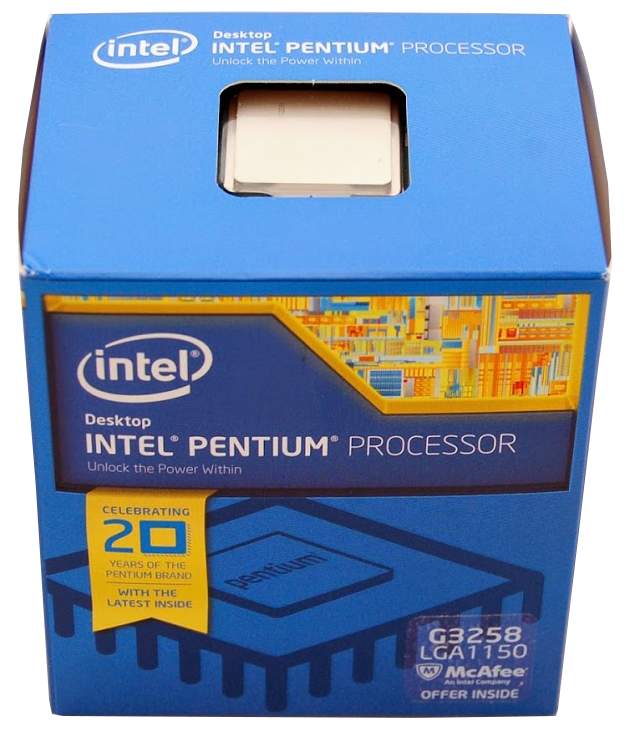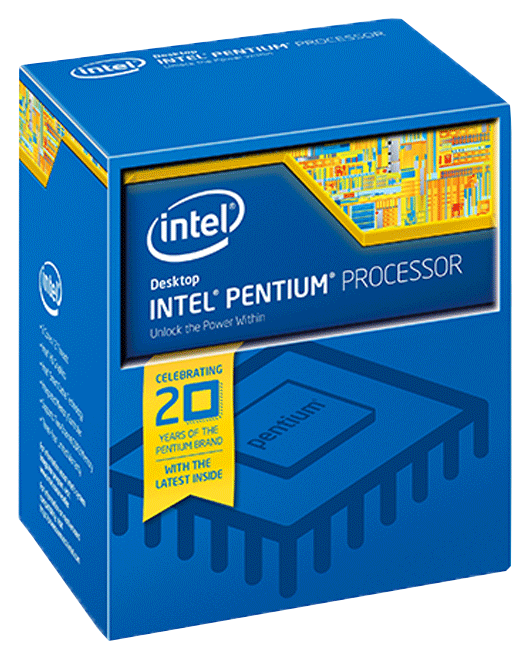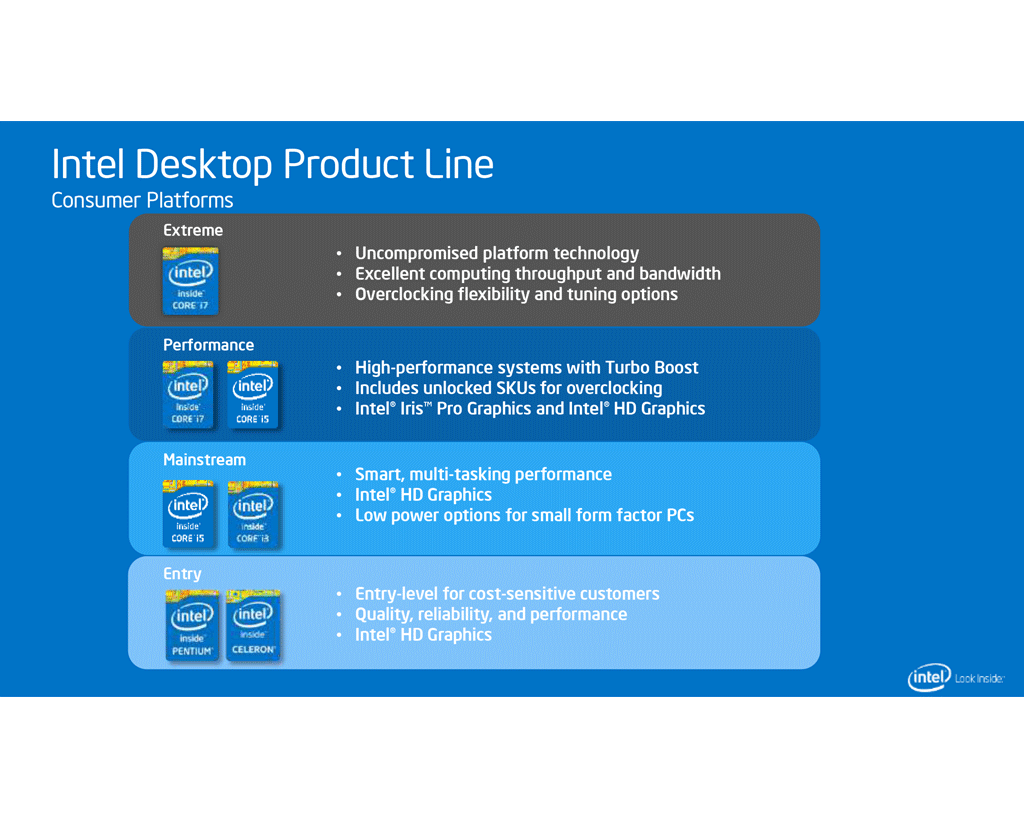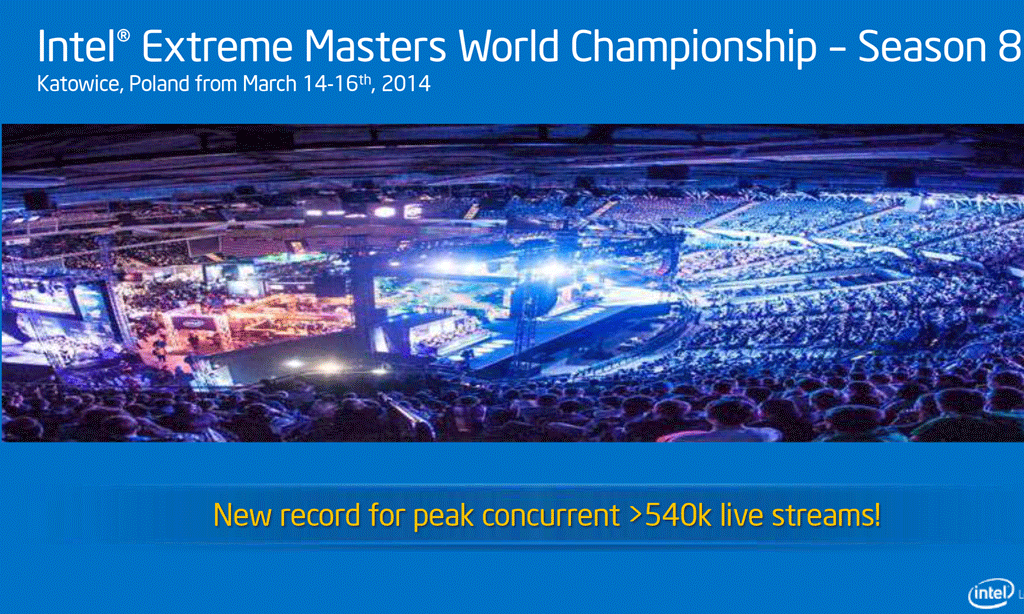INTRODUCING THE NEW PENTIUM G3258
The Intel Pentium G3258 Anniversary Edition CPU represents the first time Intel has allowed for overclocking on a Pentium series part since the introduction of it’s Core family of processors in 2009.
What makes this worth writing about is the fact that this is Intel’s first enthusiast grade processor to be released at under $100, since the Core 2 Duo E2160 (which also was capable of overclocking exceptionally well). Thus, making it very appealing to users looking to get the best bang-for-buck, or those looking to get their hands on an inexpensive overclocking chip. With all that said, it’s easy to see where Intel is going with this new Pentium.
THE CORE DIFFERENCE
You may be asking what is the difference between this CPU and a Core i5 or i7… Well, for starters, it has only two cores as opposed to the four in the i5 and i7 and lacks the hyper-threading feature of the latter. It also has lower L3 cache coming in at a mere 3 megabytes compared to 8 and 6 on the i7 and i5 respectively. It supports only 1333MHz system memory, without overclocking and has a lower-specced iGPU (integrated graphics processor unit) which shouldn’t matter because who uses those anyway, right?
Also worth noting is who the target audience of this new chip is. Intel is targeting this chip at the League of Legends and Dota 2 crowd of young PC gamers. With an attempt to create brand loyalty for more expensive chips in the future.
As PC gaming is growing more rapidly then ever before with Games like Dota 2, League of Legends and CS:GO at the forefront along with ports that have been much better then those from last decade, along with driver support becoming much better over the years. The ease of upgrading and Twitch streaming has seen a renaissance in PC gaming, with Intel’s own gaming tournaments the Intel Extreme Masters regularly getting 300k viewers during the weekends.
With this you can see why Intel is pushing for the enthusiast’s and gamers and while Pre-Built PC sales have been in the decline for the past few years custom built systems have been on the rise for the customizability, more value for the dollar and the big one overclocking. With the simplicity of overclocking and tweaking that UEFI BIOS’s have given the end user many more people are overclocking.
And Intel has had overclocking available on the higher end i5’s and i7 K’s and X chips they removed support on the lower end SKU’s something AMD never removed and gave AMD a solid footing on the budget systems, as a system builder I regularly recommend the AMD FX 6300 on budget builds but that chip retails at about $30 to $40 more then the Pentium
Review Overview
Performance
Overclocking
Price
Features
Warranty
Very solid Bang for the Buck
Although it has its flaws, The Pentium Anniversary is one of the best budget CPUs available especially with the addition of non Z97 overclocking, It performs well in lightly threaded tasks and most games.
 Technology X Tomorrow's Technology Today!
Technology X Tomorrow's Technology Today!





Nice review fggt
This review helped a bunch thanks!
Sweet review! I agree with spending the extra $30 and going AMD.
Thank’s a lot of the comment. and have a great day!
Err, that last sentence on the first page. I have to say, the FX 6300 may be more expensive, but it leaves that Pentium in the dust on multi-threaded applications. The comparable chip to the Pentium would be the 760K or 860K, which are only $10-$20 more.
The reason I mention the FX 6300 is that it does much a better job at what it does, the 760K or 860K don’t have upgrade options. Thanks for your feedback and have a wonderful day!
I went from intel to amd and back to intel, and the biggest difference to me was reliability and responsiveness. I don’t think ill ever go back to amd processors, you pay for what you get rings true for me on this occasion
‘Responsiveness’
This one is a bit confusing to me, as I know what the word means but don’t completely understand your meaning. I’d consider all modern processors to be quite “responsive” in day to day tasks, and unless you’re doing heavy workloads, it is difficult to tell one processor from another. If we’re talking about performance, the Intel’s generally do win-out, but for an added price, which usually goes without saying.
‘Reliability’
This one is also odd, while I understand how stressful computer-related issues can be, I have found in my experience that they are very linked to the processor. Unless your CPU (any CPU) is overheating due to insufficient cooling, or is unstable due to heavy overclocking, it is rare for it to be unreliable. What i mean by that is, for the most part a processor either works as it should or doesn’t work at all.
With all that said, if you’ve had better experiences with Intel and prefer what they offer, by all means you should definitely stick with what you know. But, I would never count any single company out of the occasion based on an anecdotal experience.